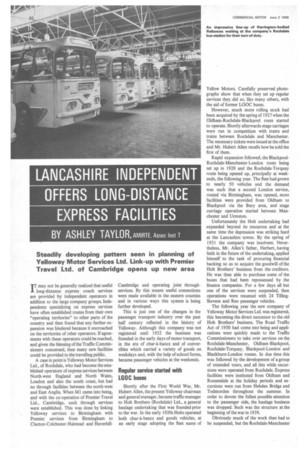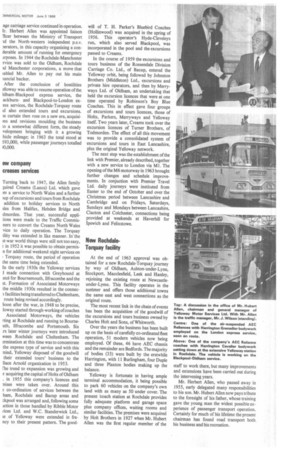LANCASHIRE INDEPENDENT OFFERS LONG-DISTANCE EXPRESS FACILITIES
Page 64

Page 65

If you've noticed an error in this article please click here to report it so we can fix it.
BY ASHLEY TAYLOR, AMIRTE, Assoc lost T
Steadily developing pattern seen in planning of Yelloway Motor Services Ltd. Link-up with Premier Travel Ltd. of Cambridge opens up new area
Jr may not be generally realized that useful may express coach services are provided by independent operators in addition to the large company groups. Independents specializing on express services have often established routes from their own "operating territories" to other parts of the country and then found that any further expansion was hindered because it encroached on the territories of other operators. If agreements with these operators could be reached, and given the blessing of the Traffic Commissioners concerned, then many new facilities could be provided to the travelling public.
A case in point is Yelloway Motor Services Ltd., of Rochdale, who had become the established operators of express services between North-west England and North Wales, London and also the south coast, but had no through facilities between the north-west and East Anglia. When Ml came into being, and with the co-operation of Premier Travel Lid., Cambridge, such through services were established. This was done by linking Yelloway services to Birmingham with Premier services from Birmingham to Clacton-Colchester-Halstead and Haverhill Cambridge and operating joint throughservices. By this means useful connections were made available in the eastern counties and in various ways this system is being further developed.
This is just one of the changes in the passenger transport industry over the past half century reflected in the history of Yelloway. Although this company was not registered until 1932 the business was founded in the early days of motor transport, in the era of char-à-bancs and of convertibles which carried a variety of goods on weekdays and, with the help of school forms, became passenger vehicles at the weekends.
Regular service started with LG 0 C buses
Shortly after the First World War, Mr. Hubert Allen, the present Yelloway chairman and general manager, became traffic manager to Holt Brothers (Rochdale) Ltd., a general haulage undertaking that was founded prior to the war. In the early 1920s Halts operated both char-i-bancs and goods vehicles, at an early stage adopting the fleet name of Yellow Motors. Carefully preserved photographs show that when they set up regular services they , did so, like many others, with the aid of former LGOC buses.
However, much more rolling stock had been acquired by the spring of 1927 when the Oldham-Rochdale-Blackpool route started to operate. Shortly afterwards stage carriages were run in competition with trams and trains between Rochdale and Manchester. The necessary tickets were issued at the office and Mr. Hubert Allen recalls how he sold the first of them.
Rapid expansion followed, the BlackpoolRochdale-Manchester-London route being set up in 1928 and the Rochdale-Torquay route being opened up, principally at weekends, the following year. The fleet had grown to nearly 50 vehicles and the demand was such that a second . London service, routed via Birmingham, was opened, more facilities were provided from Oldham to Blackpool via the Bury area, and stage carriage operation started between Manchester and Urmston.
Unfortunately the Holt undertaking had expanded beyond its resources and at the same time the depression was striking hard at the Lancashire towns. By the spring of 1931 the company was insolvent. Nevertheless, Mr. Allen's father, Herbert, having faith in the future of the undertaking, applied himself to the task of procuring financial backing so as to acquire the goodwill of the Holt Brothers' business from the creditors. He was then able to purchase some of the buses that had been repossessed by the finance companies. For a few days all but one of the services were suspended, then operations were resumed with 24 TillingStevens and Reo passenger vehicles.
The following year the new company of Yelloway Motor Services Ltd. was registered, this becoming the direct successor to the old Holt Brothers' business. The Road Traffic Act of 1930 had come into being and applications were quickly made to the Traffic Commissioners to take over services on the Rochdale-Manchester, Oldham-Blackpool, Rochdale-Torquay, Blackpool-London and Blackburn-London routes. In due time this was followed by the development of a group of extended tours, and all this while excursions were operated from Rochdale. Express facilities were instituted from Oldham and Rossendale at the holiday periods and excursions were run from Hebden Bridge and Todmorden throughout the summer. In order to devote the fullest possible attention to the passenger side, the haulage business was dropped. Such was the structure at the beginning of the war in 1939.
Obviously much of the work then had to be suspended, but the Rochdale-Manchester age carriage service continued in operation. Ir. Herbert Allen was appointed liaison Meer between the Ministry of Transport id the North-western independent p.s.v. )erators, in this capacity organizing a conderable amount of running for emergency irposes. In 1944 the Rochdale-Manchester rvice was sold to the Oldham, Rochdale id Manchester corporations, a move that tabled Mr. Allen to pay out his main iancial backer.
After the conclusion of hostilities 5lloway was able to resume operation of the ldham-Blackpool express service, the ackbumand Blackpool-to-London exess services, the Rochdale-Torquay route id also extended tours and excursions. le curtain then rose on a new era, acquisims and revisions moulding the business to a somewhat different form, the steady .velopment bringing with it a growing hide mileage; in 1963 the total stood at 593,000, while passenger journeys totalled ew company creases services Turning back to 1947, the Allen family luired Creams (Lanes) Ltd. which gave rn a service to North Wales and a further nip of excursions and tours from Rochdale addition to holiday services to North iles from Halifax, Hebden Bridge and dmorden. That year, successful appli:ions were made to the Traffic Commisners to convert the Creams North Wales vice to daily operation. The Torquay ility was extended in like manner. In' the st-war world things were still not too easy, t in 1952 it was possible to obtain permisn for additional weekend night services on Torquay route, the period of operation the same time being extended.
In the early 1930s the Yelloway services made connection with Greyhound at stol for Bournemouth, Ilfracombe and the St. Formation of Associated Motorways the middle 1 9 3 Os resulted in the conneci facilities being transferred to Cheltenham, route being revised accordingly.
"Soon after the war, in 1948 to be precise, loway started through-working of coaches Associated Motorways, the vehicles rting at Rochdale and running to Bourneuth, Ilfracombe and Portsmouth. Six .rs later winter journeys were introduced ween Rochdale and Cheltenham. The arrnination at this time was to concentrate the express type of service and with this mind, Yelloway disposed of the goodwill their extended tours' business to the llace Arnold organization in 1953.
Ile trend to expansion was growing and r acquiring the capital of Holts of Oldham . in 1955 this company's licences and nises were taken over. Around this co-ordination of services between the ham, Rochdale and Bacup areas and z.kpool was arranged and, following some iction in those handled by Ribble Motor /ices Ltd. and W.C. Standerwick Ltd., ie of Yelloway were extended in frency to their present pattern. The good will of T. H. Parker's Bluebird Coaches (Hollinwood) was acquired in the spring of 1956. This operator's Hyde-Cleveleys run, which also served Blackpool, was incorporated in the pool and the excursions passed to Creams.
In the course of 1959 the excursions and tours business of the Rossendale Division Carriage Co. Ltd., of Bacup, entered the Yelloway orbit, being followed by Johnston Brothers (Middleton) Ltd., excursions and private hire operators, and then by Merryways Ltd. of Oldham, an undertaking that held the excursion licences that were at one time operated by Robinson's Boy Blue Coaches. This in effect gave four groups of excursions and tours licences, those of Holts, Parkers, Merryways and Yelloway itself. Two years later, Creams took over the excursion licences of Turner Brothers, of Todmorden. The effect of all this movement was to provide a consolidated system of excursions and tours in East Lancashire, plus the original Yelloway network.
The next step was the establishment of the link with Premier, already described, together with a new service to London via Ml. The opening of the M6 motorway in 1963 brought further changes and schedule improvements. In conjuction with Premier Travel Ltd. daily journeys were• instituted from Easter to the end of October and over the Christmas period between Lancashire and Cambridge and on Fridays, Saturdays, Sundays and Mondays between Lancashire, Clacton and Colchester, connections being provided at weekends at Haverhill for Ipswich and Felixstowe.
New RochdaleTorquay facility At the end of 1963 approval was obtained for a new Rochdale-Torquay journey by way of Oldham, Ashton-under-Lyne, Stockport, Macclesfield, Leek and Hanley, rejoining the existing route at Newcastleunder-Lyme. This facility operates in the summer and offers those additional towns the same east and west connections as the original route.
The most recent link in the chain of events has been the acquisition of the goodwill of the excursions and tours business owned by Charles Holt and Sons, of Whitworth.
Over the years the business has been built up on the basis of carefully co-ordinated fleet operation, 51 modem vehicles now being employed. Of these, 46 have AEC chassis and the remainder are Bedfords. The majority of bodies (33) were built by the erstwhile Harrington, with 11 Burlingham, four Duple and three Plaxton bodies making up the balance.
Yelloway is fortunate in having ample terminal accommodation, it being possible to park 60 vehicles on the company's own land with as many as 50 under cover. The present coach station at Rochdale provides fully adequate platform and garage space plus company offices, waiting rooms and similar facilities. The premises were acquired by Holt Brothers in 1927 when Mr. Hubert Allen was the first regular member of the staff to work there, but many improvements and extensions have been carried out during the intervening years.
Mr. Herbert Allen, who passed away in 1955, early delegated many responsibilities to his son. Mr. Hubert Allen now pays tribute to the foresight of his father, whose training gave the young man the widest possible experience of passenger transport operation. Certainly for much of his lifetime the present chairman has found road transport both. his business and his recreation.








































































































































































